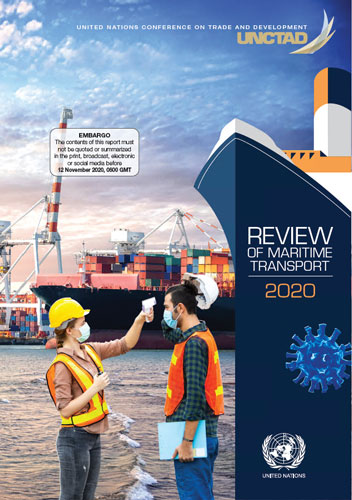Review of maritime transport 2020/Обзор морского транспорта 2020
Издание на английском языке
The Review of Maritime Transport 2020 was prepared by UNCTAD under the overall guidance of Shamika N. Sirimanne, Director of the Division on Technology and Logistics of UNCTAD, and under the coordination of Jan Hoffmann, Chief of the Trade Logistics Branch. Administrative support was provided by Wendy Juan. Regina Asariotis, Mark Assaf, Gonzalo Ayala, Ahmed Ayoub, Hassiba Benamara, Dominique Chantrel, Jan Hoffmann, Alexandre Larouche-Maltais, Anila Premti, Luisa Rodriguez, Sijia Sun and Frida Youssef were contributing authors.
The coronavirus disease (COVID-19) pandemic has underscored the global interdependency of nations and set in motion new trends that will reshape the maritime transport landscape. The sector is at a pivotal moment facing not only immediate concerns resulting from the pandemic but also longer-term considerations, ranging from shifts in supply-chain design and globalization patterns to changes in consumption and spending habits, a growing focus on risk assessment and resilience-building, as well as a heightened global sustainability and low-carbon agenda. The sector is also dealing with the knock-on effects of growing trade protectionism and inward-looking policies.
The pandemic has brought to the fore the importance of maritime transport as an essential sector for the continued delivery of critical supplies and global trade in time of crisis, during the recovery stage and when resuming normality. Many, including UNCTAD and other international bodies, issued recommendations and guidance emphasizing the need to ensure business continuity in the sector, while protecting port workers and seafarers from the pandemic. They underscored the need for ships to meet international requirements, including sanitary restrictions, and for ports to remain open for shipping and intermodal transport operations.
The Review of Maritime Transport 2020 provides an update on the latest trends in maritime trade, supply, markets, key performance indicators, and legal and regulatory developments. It also includes a special chapter with testimonials from maritime stakeholders and their experiences in coping with the COVID-19 pandemic.
Contents
Acknowledgements
Abbreviations
Note
Executive summary
1. International maritime trade and port traffic
A. Volume of international maritime trade and port traffic
B. Maritime trade in the era of pandemic
C. Outlook
D. Summary and policy considerations
2. Maritime transport services and infrastructure supply
A. World fleet and maritime workforce
B. Shipping companies, earnings and revenues and operations during and beyond the pandemic crisis
C. Port services and infrastructure supply
D. Conclusions and policy considerations
3. Performance indicators
A. Port calls and turnaround times
B. Container shipping: Liner shipping connectivity
C. Container shipping: Port performance
D. Port performance: Lessons learned from the TrainForTrade Port Management Programme of UNCTAD
E. Shipping: Emissions of the world fleet
F. Summary and policy considerations
4. The coronavirus disease 2019 pandemic: lessons learned from first-hand experiences
A. Invited reflections on the coronavirus disease 2019 pandemic in maritime transport and hinterland connections
B. Experience of small island developing States: Small island developing States in the Pacific
C. Experience of an authority coordinating a transit and transport corridor: Northern Corridor Transit and Transport Coordination Authority, East Africa
D. Experience of an authority managing an international maritime passage: Panama Canal Authority
E. Experience of a port authority: Port Authority of Valencia
F. Experience of a global shipping company: Mediterranean Shipping Company
5. Legal issues and regulatory developments
A. Technological developments and emerging issues in the maritime industry
B. Regulatory developments relating to international shipping, climate change and other environmental issues
C. Other legal and regulatory developments affecting transportation
D. Status of conventions
E. COVID-19 legal and regulatory challenges for international shipping and collaborative action in response to the crisis
F. Summary and policy considerations




